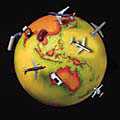 About F&D Subscribe Back Issues Write Us Copyright Information Free Email Notification Receive emails when we post new
items of interest to you. |
From the editor In recent years, industrial country leaders have boosted their pledges of aid and debt relief for the poorest countries, but what they have given with one hand they have taken away with the other. For example, industrial countries spent $50 billion in foreign aid in 2001. Yet they provided six times this amount in agricultural support, which depressed world prices and hurt income prospects in poor countries by keeping agricultural exports out of their markets. The need for greater coherence between trade and development policies has figured prominently at high-level international meetings in Doha, Monterrey, and Johannesburg over the past year. The challenge now is to move from words to deeds. A coherent approach would rely on trade policies that create market opportunities for developing countries, development assistance that improves their supply response, and reforms in the developing countries themselves that ensure that trade and aid stimulate growth and reduce poverty. This issue of Finance & Development focuses on the opportunities for all countries to improve their lot through "trading up," especially with the November 2001 launch of the Doha trade round. The major gainers stand to be the liberalizers themselves, which is why developing countries need to move rapidly to lift their own barriers. But, in agriculture, the industrial countries should lead the way; their agricultural sectors are relatively small, and they have the resources to ease the transition. Such a move would also provide a vital signal about their commitment to trade reform and remove an excuse for others not to liberalize. Opening markets would not only boost trade and global growth—and thus help reduce poverty—it would also bring greater stability to the global economy, ensuring a healthier international financial system. With so much to gain, why is protectionism still alive and kicking? As Peter Sutherland, former Director-General of the World Trade Organization (WTO), reminds us in his Point of View, "the real trade wars take place within countries, between consumers and special interest groups." And he should know. In mid-1993, he took over the organization at a time when the eight-year-old Uruguay Round trade talks were moribund, with participants taking deeply entrenched positions. But, by the end of the year, he managed to strike a deal. One of the beauties of multilateral trade talks is the leverage they provide over domestic special interests. When the Doha negotiators gather, they will represent nearly every country. In late 2001, China became the WTO's 143rd member. F&D explores the fears and hopes of industrial and developing countries alike as this economic giant takes its place at the table. It also probes what opening up to trade has done for income distribution in China—a pattern far more complex and hopeful than normally reported. * * * * * Also in this issue, Kenneth Rogoff, the IMF's Economic Counsellor and Research Department Director, returns to a topic he first started speculating about in the 1980s: whether large IMF loans to crisis countries should generate worries about "moral hazard." His column is particularly timely given recent large loans to some emerging market economies. Laura Wallace
Opinions expressed in articles and other materials are those of the authors; they do not necessarily reflect IMF policy. � 2002 by the International Monetary Fund. All rights reserved. Requests for permission to reproduce articles should be sent to the Editor-in-Chief. Finance & Development will normally give permission promptly, and without asking a fee, when the intended reproduction is for noncommercial purposes. |